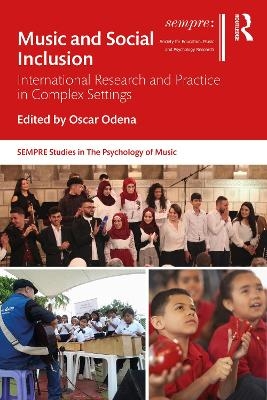
Music and Social Inclusion
Routledge (Verlag)
978-1-032-03719-6 (ISBN)
How do we develop social inclusion through musical activities? What is the power of music in enhancing individual inclusion, group cohesion, and cross-community work in post-conflict environments? How can we investigate social music programmes and interventions? This comprehensive volume offers new research on these questions by an international team of experts from the fields of music education, music psychology, ethnomusicology, and community music. The book celebrates the rich diversity of ways in which learners of all ages participate in social music projects in complex settings. Contributions focus broadly on musical and social processes, considering its conceptualisation and practices in a number of contexts. The authors examine how social music projects can be fostered in complex settings, drawing examples from schools and community settings. These critical chapters will inspire readers to think deeply about social music interventions and their development. The book will be of crucial interest to educators, policymakers, researchers, and students, as it draws on applied research from across 14 countries, of which ten are in the Global South.
Oscar Odena is Professor of Education at the School of Education and the School of Interdisciplinary Studies, University of Glasgow, UK. His areas of expertise comprise qualitative research approaches, inclusion, creativity, and music education. He has authored over 80 papers, and his monograph Musical Creativity Revisited was published by Routledge in 2018. He has been Principal Investigator in four projects on the role of the arts for inclusion and social cohesion. He serves on the boards of leading journals and the review colleges of the UK Arts and Humanities Research Council and Irish Research Council.
Introduction
Part I – Foundations
Chapter 1 – Exploring the order and disjuncture of music projects in places affected by war, Gillian Howell
Chapter 2 – A model for developing music and music education activities for social cohesion in complex settings, Oscar Odena
Part II – Cross-community environments
Chapter 3 – ‘I just feel I belong here’: homeless choirs and singing groups in the UK and Brazil, Shelly Coyne and Raymond MacDonald
Chapter 4 – ‘Participatory songwriting’ as process/narrative: insights from a community music project with diverse communities in the north east of England, Sam Slatcher
Chapter 5 – Playlists, connection and covid: making sense of lockdown and loss with songs in Mexico City and Glasgow, Valeria Gascón
Chapter 6 – What are the landmarks in a community music project? The case of the Kithara project, Daniel Mateos-Moreno
Chapter 7 – The impact of music education in social projects: two cases in south Brazil, Sergio Figueiredo and Oscar Odena
Chapter 8 – Crescendo: using a music education programme to improve social outcomes in disadvantaged communities, Conneth Poland, Liam O’Hare and Leeanne O’Hara
Chapter 9 – Does the 21st century music curriculum enable Northern Ireland’s children sing each other’s songs?, Jenny Scharf and Oscar Odena
Chapter 10 – There is no global justice without global cognitive justice: envisioning music education through the ecology of knowledges in the context of Mexico, Hector Vázquez-Córdoba
Part III – Conflict and post-conflict environments
Chapter 11 – The art of positive fatalism, Lukas Pairon
Chapter 12 – Arts for peace education in Chihuahua, Mexico: efforts, outcomes and challenges of two community music programs, Patricia A. González-Moreno and Rubén Carrillo
Chapter 13 – Conflict transformation, scalability and the non-governmental ear in a hip-hop social project in Iztapalapa, Mexico City, Andrew Green
Chapter 14 – Expedición sensorial programme: transformations in the role of cultural policies in peacebuilding in Colombia, Andrea Rodríguez-Sánchez and Gloria Zapata-Restrepo
Chapter 15 – Using sound ethnography to study a social music programme in Colombia, Andrea Rodríguez-Sánchez, Oscar Odena and Alberto Cabedo-Mas
Chapter 16 – Every voice counts: the Listening Guide Method as a methodology to analyse musical and political identities of FARC ex-combatant musicians, Santiago Niño Morales and Raymond Macdonald
Afterword. Beyond inclusion, Geoff Baker
| Erscheinungsdatum | 12.12.2022 |
|---|---|
| Reihe/Serie | SEMPRE Studies in The Psychology of Music |
| Zusatzinfo | 11 Tables, black and white; 12 Line drawings, black and white; 6 Halftones, black and white; 18 Illustrations, black and white |
| Verlagsort | London |
| Sprache | englisch |
| Maße | 156 x 234 mm |
| Gewicht | 660 g |
| Themenwelt | Kunst / Musik / Theater ► Musik |
| Geisteswissenschaften ► Psychologie ► Allgemeine Psychologie | |
| Geisteswissenschaften ► Psychologie ► Sozialpsychologie | |
| Geisteswissenschaften ► Psychologie ► Verhaltenstherapie | |
| ISBN-10 | 1-032-03719-9 / 1032037199 |
| ISBN-13 | 978-1-032-03719-6 / 9781032037196 |
| Zustand | Neuware |
| Informationen gemäß Produktsicherheitsverordnung (GPSR) | |
| Haben Sie eine Frage zum Produkt? |
aus dem Bereich


